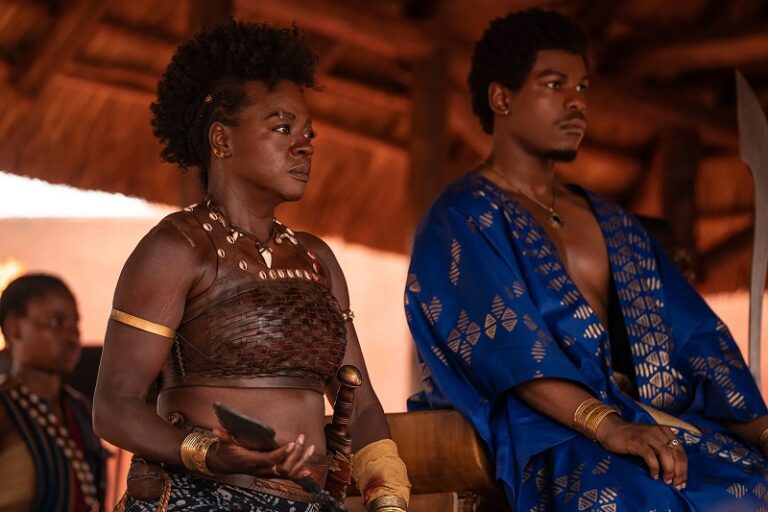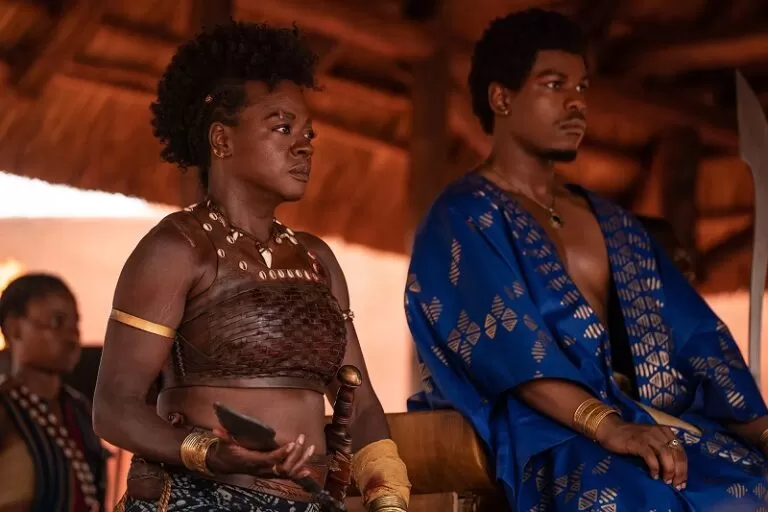

‘the woman king’ beholds complicated history
In the dark of night, an intimidating Viola Davis as General Nanisca quietly emerges from a bed of long grass. Behind her, a full army appears out of the grass in silence, each soldier standing ready with a weapon in hand.
The Agojie, a troop of female warriors who battled for the kingdom of Dahomey, are unassuming and keep a low profile when we first encounter them on screen. However, at the height of their supremacy in 19th-century West Africa, they were known for being aggressive, strong, and unmatched.
The historical epic The Woman King, released on September 16 by Gina Prince-Bythewood, details the struggles and victories of the Agojie and Dahomey (a region in present-day Benin). The movie’s historical advisor was Leonard Wantchekon, a professor of politics and international affairs at Princeton University. He is nearing completion of a book that will include biographies of more than 50 members of the Agojie based on conversations with their communities and relatives.
Regarding the female fighters, Wantchekon asserts, “I think it’s something which even today would be called revolutionary.” “Because of all the training and preparation that was required, it actually took place. It is not fabricated.”
The Dora Milaje in Black Panther is probably the most well-known representation of the Agojie in pop culture, despite the fact that the Agojie are very much genuine and have been for more than a century. Initially appearing in Marvel comic books, the all-female special forces for the fictitious African nation of Wakanda transitioned to the big screen in 2018, where they played a crucial role. (The follow-up, Black Panther: Wakanda Forever, seems to place even more of an emphasis on the Wakandan women.)
Black Panther, in particular, helped to prepare the road for this movie, according to Prince-Bythewood, especially in a field where studios haven’t always given attention to the tales of people of colour. However, The Woman King is the first significant cinematic picture to tell the story of the Agojie in the United States. It also discusses Dahomey’s involvement in the slave trade, but it glosses over the fact that the kingdom’s participation was only momentarily halted in 1852 by the ruling monarch at the time.
The historical advisor Wantchekon is from Benin and was born a mile outside the former palace of King Glele, the ruling monarch in The Woman King and the son of King Ghezo (played by John Boyega.) In the film, King Ghezo and General Nanisca have a special relationship because she serves as his right-hand woman and gives him expert military strategy advice.
Wantchekon asserts that Dahomey is portrayed in the film as a highly, highly sophisticated state in the modern sense, complete with a permanent army, a bureaucracy, and officials in charge of logistics. “It comes as no great surprise that something so amazing as these female warriors emerged from these institutions.”
As a historical consultant, Wantchekon saw to it that Dahomey was depicted as a sophisticated, independent state rather than a stereotypically backward tribe. For instance, the Agojie and their male equivalents frequently made their own weapons rather than importing them exclusively from Europe. In one scenario, a new recruit named Nawi (Thuso Mbedu) goes to the river in search of the ideal rock to sharpen her blade.
Of course, the Agojie didn’t exist in a vacuum. Wantchekon’s research focuses a lot on the social and political settings in Dahomey that promoted the ascent of the most skilled female fighters. According to Wantchekon, “you can view those institutes for women in solitude, as if it came from the sky or somewhere.” But they are a result of a social climate that allows women to engage in any activity they choose, including fighting in war.
The Agojie’s very existence was unusual; European travellers called them the Dahomey Amazons in honour of the all-female Amazon warriors from Greek mythology. Wantchekon identifies three crucial factors that contributed to the Agojie’s success in Dahomey.
First, despite the fact that the first time they were mentioned in writing was in 1729, it is unclear where the Dahomey Amazons actually came from. According to one account, the Agojie were originally a devoted tribe of elephant hunters. However, Wantchekon asserts that in the early 1700s, the twin sister of King Akaba, Queen Hangbe, introduced the idea of the female warriors.
Second, Wantchekon personally witnessed the adoption of progressive gender norms in the area: Growing up in Benin, he experienced gender equality wherever he looked, from small children playing together to mixed-gender cultural organisations to women participating in the workforce. These gender norms that are inclusive at least go back to the Dahomey.
Third, King Ghezo sparked an increase in military might. The idea was there, the social circumstances were favourable, but King Ghezo showed the way and brought it to the maximum level of organisation and participation, according to Wantchekon. Between one-third and forty percent of the entire army were women. (The Agojie had as many as 6,000 members at its height.)
The 2025 edition of AFCON will be hosted by Morocco which serves both the high-level competition and as a catalyst…
The Christian community marks Good Friday as its deepest holiday to remember when Jesus died at Calvary. The Christian community…
Art has the potential to take the talents from any regions across the globe, and this world has witnessed one…
Thousand of users worldwide face a discontinuation of WhatsApp services on older Android versions as Meta has officially announced this…
Disaster teams in KwaZulu-Natal stand ready to respond to persistent rainfall while drivers should approach roads with care. According to…
Starlink the satellite internet company by Elon Musk is growing fast in Africa. It now works in more than 20…
This website uses cookies.